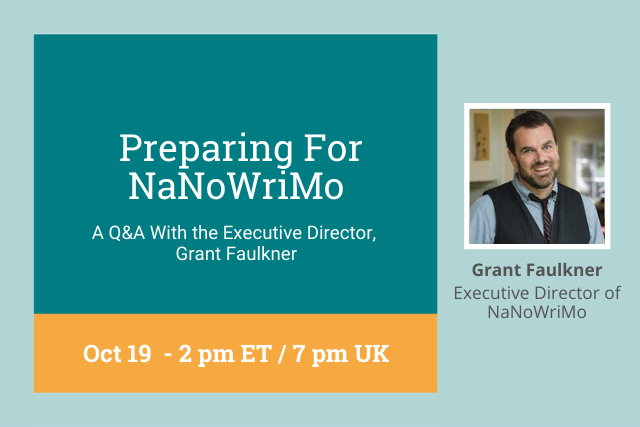
Even though I've been writing and editing in some capacity for most of my adult life, it wasn't until I pledged to take on the NaNoWriMo challenge that I was able to cross the finish line on a book-length project.
I had started and abandoned manuscripts and screenplays over the years, but for me, the attraction of the 30-day deadline compelled me to put on my virtual writing blinders, put my head down, and commit to the project like a full-time writer.
I say "like a full-time writer" because I've always had multiple work projects afloat, and it's safe to assume that if you're taking on the NaNoWriMo challenge, you're doing something else full-time. That means you're juggling the rigors of your regular job with the demands of your regular life and are hard-pressed to block hours aside every day to pursue an indulgence like writing a novel.
NaNoWriMo proved to me you can do just that, at least for 30 days, which—it turns out—is enough time to write a full-fledged, full-length, first draft of a book.
So why not dive in? Put on those blinders and get to work. But don't work blind... you'll do best if you have a plan and a writing process that optimizes your time and boosts your productivity. Here are some ideas that can help you prepare for this journey to keep your fingers flying, the inspiration flowing, and the momentum going in your quest to complete your book's first draft.
- 1: Identify Your Big Idea
- 2: Meet Your Cast
- 3: Create an Outline
- 4: Have a Word Count Goal
- 5: Schedule Time Every Day to Write and Stick to It
- 6: Plan Some Downtime in Your Schedule
- 7: Leave Yourself Something to Come Back To
- 8: Don't Expect Perfection
- 9: Don't Get Hung Up
- 10: Work On the Story Away from Your Writing Environment
- 11: Develop a System to Keep Track of Everything
- 12: Don't Be Afraid to Delete
- 13: Be Observant
- 14: See It Through to the End
- 15: You're Not Done Yet…
- Start editing like a pro with your free ProWritingAid account
1: Identify Your Big Idea
A novel starts with a big idea.
But it needs to be big—novel big. Maybe even series big.
The idea could be the inciting incident of the plot, it might be a fantasy story-world, or it could be the moral of the story. It's your job as the writer to craft a story that delivers the message. You need to bring this idea to life, so you have to love it, believe in it, and want to read it yourself. You need to be excited about this!
2: Meet Your Cast
You'll learn a lot about your characters as you write. There are probably a few lurking backstage that you don't even know yet, but you need to know your main protagonists and antagonists and have some broad and detailed ideas about them before you commit them to the page.
Give them names, even if you're not 100% committed to them. Everything is malleable, anything can be changed, but naming a character gives him/her an essence that can help inform their personality. Listen to them. How do they speak? Imagine your characters in scenarios and situations outside of your story that define their character and give them a voice and a motivation. Jot down details, personality quirks, likes and dislikes, and keep that info at hand.
3: Create an Outline
There is plenty of debate on how to outline a novel, how detailed it should be, and whether you should outline at all. In my experience, some form of an outline is helpful in 90% of writing projects—especially big writing projects.
Having a road map helps you see where you're going and where you are on the journey. Like everything else in the writing process, this likely will change as your story evolves. New ideas will fuel new directions and tangents and possibly new characters or new conflicts. This is all part of the process, and having an outline can help you keep the strands on point.
4: Have a Word Count Goal
This is not the most important part of the process, and as a first-time author, it might not even really compute, but there's something useful in setting a target. NaNoWriMo suggests a 50,000-word goal and novels can vary widely in length, but setting a final word count goal, particularly in the grand scheme of NaNoWriMo, can help you set daily goals and give you something to aspire to.
This, again, can be a moving target. I'll admit to extending my NaNoWriMo deadline because my story ended up being thousands of words longer than I budgeted for, but I stuck to my daily schedule and finished a week late. Don't tell anyone.
5: Schedule Time Every Day to Write and Stick to It
Some authors advise you write at the same time every day—wake up early and get two hours in before you do anything else, set time aside in the evening and write just before bed—whatever works for you.
My day-to-day schedule requires a little more flexibility, which means I don't write at the same time day after day. Instead, I spend time every Sunday blocking out the hours for each day of the week when I'll be sitting at my computer writing. Generally speaking, I rarely achieve 100% adherence to my schedule, but I did manage to consistently meet my NaNoWriMo weekly goals. That can only happen if you set them!
6: Plan Some Downtime in Your Schedule
Taking time away from writing, even if it's one out of every seven days, gives you a necessary break from the routine and lets you think about your project in a different way.

It also affords the opportunity to get a leg up. If you find yourself inspired on a day when you planned a break and you get some quality writing time in, it's a bonus that can give you an emotional boost in the midst of your project.
7: Leave Yourself Something to Come Back To
Some days the muse is firing and words, ideas, and passages of your story flow with little effort. Other days, that's not the case. It helps, particularly on the days where the spark isn't there, to have a specific agenda to conform to—to be able to sit at your desk and know exactly what scene you'll be writing.
You can set yourself up in the previous writing session by writing yourself right up to the brink of an important scene or a major piece of action—or leaving an important scene half-written. That way, when you sit down to write, the table is set and you can get right down to business.
"The best way is always to stop when you are going good and when you know what will happen next. If you do that every day when you are writing a novel you will never be stuck."
—Ernest Hemingway, Monologue to the Maestro
8: Don't Expect Perfection
Of course, you want your writing to be perfect—or at least something that approaches perfection. Whatever your definition of perfection is for your finished manuscript, don't expect that from your first draft. Moving the story forward and getting the words out of your head and onto paper (digital or physical) is the goal of these early sessions.
There will be re-writing and editing phases where words and ideas are honed, deleted, and otherwise transmogrified in the pursuit of perfection. Toiling over every last word choice in this first stage of writing is not the best use of your time.
9: Don't Get Hung Up
If you get stuck looking for the right phrasing, move on rather than getting hung up on it. With word processors (or old-fashioned highlighter pens), you can color-code text to mark words or sections you know you want to revisit in later readings.
I often use orange or green text to highlight and mark spots where a specific word or phrase isn't coming to me. A day or two later, or even later in the same session, a re-read of that passage often reveals the word instantly, or I'll find a different phrase or approach that completes the thought more adeptly.
You can use this approach to leave yourself something to come back to—perhaps to deliver a more robust description of a setting or a passage of dialogue. Color-code that spot with a note—Jim confronts Jerry about his lack of empathy—and write that the next time you work. I often find myself working on sections of dialogue in my head between writing sessions. When I come back to it, it's like transcribing a conversation I've already heard.
10: Work On the Story Away from Your Writing Environment
You can develop details of your story as you lie in bed before falling asleep, while driving, or in various places away from your writing environment. It's hard to avoid. Once you immerse yourself in your story, you'll find yourself visualizing scenes and dialogue at all sorts of odd moments during the day.
I keep a journal with me and jot down character descriptions, plot ideas, revelations, new connections between characters and events... any manner of random ideas. Some never get used, others find their way into the story.
11: Develop a System to Keep Track of Everything
I have a corkboard near my desk where I post index cards with bits of information: names of characters, physical descriptions, details and notes about people, places, and settings in the story. Having these notes visible at a glance, rather than having to hunt for the information buried deep in my ever-growing manuscript, helps avoid distractions and keeps the words flowing.
12: Don't Be Afraid to Delete
Even in the first-draft phase, don't be afraid to kill your darlings. If a scene isn't working, goes in the wrong direction, or just isn't necessary, remove it. Even passages you like, where descriptions are vivid and the action crisp, are better off deleted if they don't propel the story forward or achieve something useful. I create a separate document where I can paste these passages in case I want to harvest tasty ideas or descriptions another time.
13: Be Observant
There is no shortage of places where you can find inspiration. Nothing is mundane if you immerse yourself in it. Be creative. Use your immediate surroundings. Describe the feel of the keyboard under your fingers or the cushion of the seat you're in. Describe the sound of the distant lawnmower and the birdsong you hear through your open window. Challenge yourself to see things in the room you're in with fresh eyes.
If you're ever stuck, use this practice to get yourself writing about something—maybe you can use it in your piece, or maybe you can apply that level of observation to describe the smell of the forest your character is walking in, or the distant sound of the lawnmower she can hear through her open window...
"When people talk, listen completely. Don’t be thinking what you’re going to say. Most people never listen. Nor do they observe. You should be able to go into a room and when you come out know everything that you saw there and not only that. If that room gave you any feeling you should know exactly what it was that gave you that feeling. Try that for practice. When you’re in town stand outside the theatre and see how the people differ in the way they get out of taxis or motor cars. There are a thousand ways to practice."
—Ernest Hemingway, Monologue to the Maestro
14: See It Through to the End
Something powerful happens when you write your final sentence. For me, it was almost shocking. I didn't know what the last line would be. I wrote it and I stopped and I almost couldn't breathe because I knew, at that moment, that I had completed my book. A tingle of excitement and accomplishment washed through me. You deserve to experience that feeling. I'm ready to feel it again.
15: You're Not Done Yet…
What you complete in this round is the first of many drafts—in fact, you've probably got three more drafts to deliver before your manuscript is truly done.
The revision process is a chance to experience your story in a new way. No doubt you will have been editing and revising throughout the first draft stage, but now that you have a completed first draft in hand, your perspective shifts because... you've written a book! Make sure to take some time to congratulate yourself on that before getting down to the serious business of editing.
Start editing like a pro with your free ProWritingAid account
When you do start your edit, it never hurts to get a little help.
ProWritingAid is one of the best grammar checkers out there - but it's far more than that! The Editing Tool also looks at elements of structure and style that have an impact on how strong and readable your writing is.
More, it helps you learn as you edit, making you a better writer every time you use the program.
The best way to find out how much ProWritingAid can do is to try it yourself!
Preparing For NaNoWriMo: A Q&A With the Executive Director, Grant Faulkner
November is fast approaching, and with it comes National Novel Writing Month, the writing challenge that asks you to write a 50,000 word novel in 30 days.
We've asked the ultimate NaNo expert—NaNoWriMo Executive Director, Grant Faulkner—to share his advice. Join us for a Q&A and get all your questions answered.


